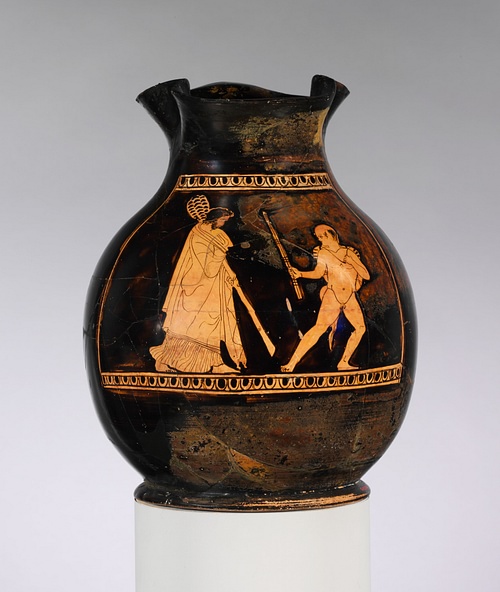
The Anthesteria celebrated two seemingly disparate things: wine and the dead. Both Dionysos and Hermes Chthonios (Hermes of the Underworld) were celebrated as part of this festival. In many ways, the Anthesteria is similar to our modern Halloween.
The festival took part over three days, from the 11th-13th of the month of Anthesterion (late February to early March by our calendar), with each day being given a special name. Both 'Anthesteria' and 'Anthesterion' derive from the Greek word anthos (flower), relating to their springtime setting. It should be noted that women, children, and slaves participated in this festival, too.
11th Anthesterion: the Pithoigia
The name of this day relates to its events and literally means, 'the opening of the pithoi (storage jars)”. On this day people gathered at the Sanctuary of Dionysos in Limnais, but did not enter it, and opened the pithoi that contained the wine made from the last autumn's grapes. The wine was then drunk. The drinking of the new wine on this day was quite sociable and moderate compared to the drinking which occurred on the second day.

12th Anthesterion: the Choes
The Choes was the main day of the Anthesteria. The name of the second day refers to the shape of the vessels from which the wine was drunk, the chous. On this day city-wide drinking of wine at private parties occurred. There was even a drinking competition that the Archon Basileus oversaw. Aristophanes recalls the opening words of this contest:
“Listen-up, people! In accordance with the ways of our ancestors, drink the chous on the sound of the trumpet! And he who downs it first will take away a wineskin…" Aristophanes, Acharnians, 1000-1002
This contest was no mean feat, as a chous could contain around three litres of wine.
It is supposed that the custom of drinking wine during this day of the Anthesteria, with each man taking his own vessel and drinking it in silence, was based on the myth of Orestes. According to this mytn, when Orestes entered Athens after killing his mother, no one wanted to offer him their hospitality because he was polluted. But, feeling shame for him, they invited him in with a solitary hospitality, giving every diner an individual wine cup to drink from and enforcing silence throughout the dinner so as to distance themselves from Orestes. The normal custom when drinking at a dinner party would be to share wine from the host's vessels while partaking in conversation and word games. At Euripides' dinner party Orestes recalls his role in such traditions in no uncertain terms in Euripides' Iphigenia in Tauris:
“I hear that my misfortunes have become a religious rite in Athens,
And that they still maintain this custom,
And that the people of Pallas honour the cup of the Feast of Pitchers [in reference to the chous and the Anthesteria].” Euripides, Iphigenia in Tauris, 958-960
The sacred marriage of the King Archon's wife to Dionysus was enacted on this day in a staged ritual that began by bringing Dionysus into the city. It was also on the Choes that the Sanctuary of Dionysus in Limnais was opened up for secret rites (though it is possible the temple was open for slightly longer than a strict 24 hours).
However, it was also believed that on this day the ghosts of the deceased walked the city. This meant that the Choes and the Chytroi were 'unlucky' days, and all other temples and business were closed during them. To protect themselves from these wandering spirits, the Athenians covered the doors of their houses with pitch and chewed hawthorn leaves. The ghosts would stick to the pitch if they tried to enter the house and the hawthorn had apotropaic qualities.
13th Anthesterion: the Chytroi
The Chytroi was named after the pots that were filled with a porridge-like mixture (made from seeds and grains) that were dedicated to Hermes Cthonios by individual families on this day. At the end of this day, families would go round their household rooms and shout “'Out the door [spirits]! Anthesteria is over.” Generally speaking, we do not know who these ghosts were or why they entered the world of the living during the Anthesteria. However, one specific sacrifice which took place on the Chytroi helps us to better understand the connection between the new wine of the season and the placating of the dead. On the last day of the Anthesteria, a meal was offered to Erigone, the mythological daughter of Icarius. Icarius was the mortal to whom Dionysus had famously given the gift of wine. However, after the death of Icarius, Erigone killed herself, hence giving a mythological precedent for the joint worship of wine and the dead.

Conclusion
The Anthesteria was not as grand in its public processions and rituals as other Athenian festivals, such as the Great Dionysia or the Great Panathenaea. Much of the festival seems to relate to personal or familial activities, such as drinking in silence and not sharing one's wine and the household sacrifices of porridge. Underlying the Anthesteria is the importance of wine in ancient Greece (while this definition relates to the Athenian festival, it should be noted that other Athensteria were celebrated by other Ionian cities). Wine was so important that Dionysos was celebrated each year for the creation of new wine. Furthermore, because the spirits of the dead roamed the city on the 'unlucky' 12th and 13th Anthesterion, the festival also reminds us that the Athenians, and the ancient Greeks more generally, were very superstitious.







